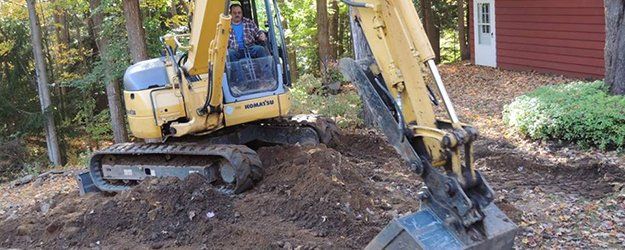Cost Effective Lancaster Excavation - Top Quality Excavation at Competitive Rates
Cost Effective Lancaster Excavation - Top Quality Excavation at Competitive Rates
Blog Article
Comprehensive Excavation Approaches: Grasping the Basics for Success
The mindful preparation, accurate execution, and careful attention to detail required in excavation jobs require a detailed technique that incorporates numerous fundamental facets. The real mastery lies not simply in understanding these fundamentals however in seamlessly integrating them to navigate the complexities of excavation tasks with skill.
Recognizing Excavation Project Planning

The preliminary phase of any excavation project is the planning phase, where vital decisions are made that can considerably influence the end result of the task. Comprehending the project timeline, range, and spending plan restraints is vital for producing an extensive excavation strategy that ensures the job's success.
One key aspect of excavation project planning is the development of a detailed timeline that lays out the series of tasks, milestones, and due dates. This timeline offers as a roadmap for the project team, permitting them to track progress and make needed modifications to guarantee the task remains on timetable. Furthermore, a well-defined spending plan that accounts for all costs, including devices leasing, labor expenses, and materials, is crucial for avoiding price overruns and delays. By meticulously considering all these aspects during the planning stage, excavation jobs can be performed successfully and properly, resulting in successful results.
Soil Evaluation and Website Analysis
Performing complete soil analysis and site assessment is a critical step in the prep work stage of any type of excavation task. Dirt analysis includes figuring out the composition, framework, and residential properties of the soil at the excavation website. This details is important for recognizing the soil's bearing capability, dampness material, and potential for disintegration, which are key consider establishing the excavation techniques and equipment needed for the job.
Site evaluation surpasses dirt analysis and encompasses a more comprehensive analysis of the overall site conditions. This examination consists of recognizing any kind of possible threats, such as below ground utilities, environmental problems, or unsteady terrain, that could affect the excavation process. By extensively reviewing the website, project supervisors can establish reliable excavation methods that prioritize safety, performance, and ecological defense.
Making use of innovative technologies like ground-penetrating radar, dirt tasting, and drone studies can boost the precision and effectiveness of dirt analysis and site assessment. Spending time and sources in these initial actions can inevitably conserve time and avoid pricey delays or problems throughout the excavation procedure.
Equipment Selection and Usage
Efficient excavation tasks depend greatly on strategic equipment selection and utilization to make certain optimum efficiency and performance. Choosing the appropriate tools for the job is vital in making the most of efficiency and lessening downtime. Elements such as the sort of soil, deepness of excavation, and job extent play a click here to find out more considerable function in identifying one of the most appropriate tools for the task available.

Along with selecting the ideal equipment, appropriate usage is crucial to job success. Operators must be trained to deal with the devices safely and efficiently - lancaster excavation. Routine upkeep checks and prompt fixings aid prevent breakdowns and guarantee consistent performance throughout the task
Safety Steps and Laws Compliance
In the realm of excavation projects, prioritizing precaution and conformity with laws is extremely important to ensuring a safe and secure and legally sound functional setting. Precaution incorporate a variety of methods, consisting of conducting complete site analyses, implementing appropriate signage and barriers, and providing adequate safety and security training for all personnel included in the excavation procedure. Adherence to laws, such as OSHA demands in the USA, makes certain that the excavation job meets the necessary standards to secure workers, lancaster excavation spectators, and the surrounding environment.

Monitoring Progression and Adjusting Approaches
Exactly how can forecast supervisors properly track the advancement of excavation jobs and adjust their strategies as necessary to enhance outcomes? Monitoring progression is important for guaranteeing that excavation projects remain on track and meet my review here target dates. Job managers can use numerous tools and strategies to track progression, such as daily report card, regular website evaluations, and advanced surveillance innovations like drones and GPS tracking systems. By continually checking the project's advancement, managers can identify any type of prospective delays or concerns early and take positive actions to address them.
Final Thought
In final thought, mastering the principles of detailed excavation techniques is important for the success of any type of project. By comprehending job preparation, examining soil and website conditions, selecting ideal devices, adhering to safety and security policies, and monitoring development, job managers can ensure a reliable and smooth excavation process. Applying these methods will certainly bring about successful end results and reduce potential threats or problems throughout the excavation project.
The preliminary phase of any kind of excavation project is the preparation stage, where important decisions are made that can significantly impact the result of the task. Understanding the task timeline, scope, and budget restrictions is crucial for producing a detailed excavation strategy that ensures the job's success.
How can forecast supervisors properly track the advancement of excavation projects and adapt their techniques accordingly to optimize outcomes? By carefully checking development and being willing to adapt techniques, job managers can improve the total success of excavation projects.
By understanding project planning, analyzing soil and site conditions, choosing appropriate tools, abiding with safety and security guidelines, and keeping an eye on development, job managers can guarantee a efficient and smooth excavation process.
Report this page